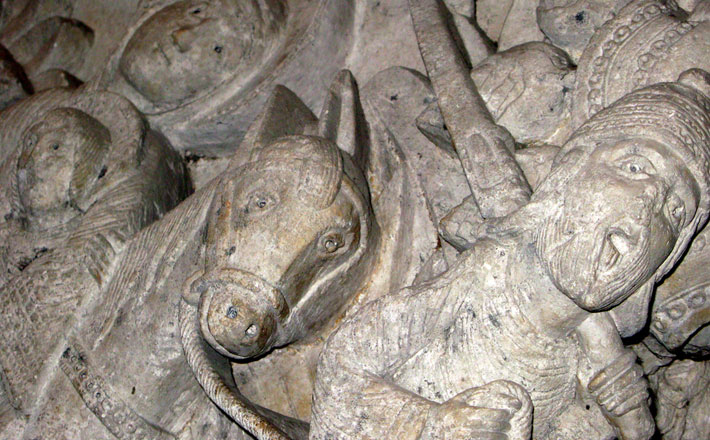Commentary on Isaiah 63:7-9
In the lectionary text for this first day of the New Year, the central theme regards the importance of thanksgiving, of taking a moment and celebrating the gracious deeds of a gracious God.
Central to this song of thanksgiving is then also the image of God’s salvation, which can be described in terms of the joyful experience of God once again putting my feet upon solid ground; of God calming the waters of the storm; of God giving me peace and quiet from the enemies around me; and of God restoring my health, my life, and my relationships.
At the dawn of this New Year, many of us may be looking at the world around us and feel that the world has gone mad: On a global level, in our respective communities all around the world, in our personal lives. We may be saying to one another: Yes, indeed, we are in desperate need of a Deliverer God. Elisabeth Johnson uses the following powerful metaphor in her book She Who Is that captures this desire well: She says that if you found yourself at the bottom of a deep dark pit with a broken arm, you desperately yearn for a Savior God who can come with a long ladder and a strong flashlight to haul you to safety (pages 266-267).
Isaiah 63:7-9 depicts such a God when it speaks of God’s great acts, of God’s steadfast love, which are exemplified in the powerful memories of God saving Israel from their enemies, and especially, and paradigmatically, from the house of slavery in Egypt. The image of what God did for Israel may also encourage one to look at one’s personal history and contemplates what God had done for me, and my family, and my people. It is not a bad idea to, at this beginning of the New Year, take a moment to proclaim in the call and response in certain faith communities: “God is good.” with the answer coming right back, “All the time.”
The image of God’s steadfast love, grace, and mercy is indeed deeply moving and vital in the time of Trito-Isaiah for a people who, after their return from Exile, continued to harbor doubts. The original audience consisted of people who desperately wanted to say “God is good,” but did not always feel that it is, “All the time.” For these people’s sake, the prophet is proclaiming in verse 9 that it was not a representative of God, his messenger, or an angel that God sent to do his saving work, but God’s holy presence self who in God’s love and pity redeemed them, and like the Good shepherd (Isaiah 40:11) or a Nursing Mother (Isaiah 49:15; 66:10-13) that they have come to know their God to be, carried them as in the days of old.
However, it is difficult to read this lectionary text in isolation. God’s saving actions that people are celebrating here is preceded by a powerful image of God as Warrior (Isaiah 63:1-6) attesting to the fact that God’s liberation is coming through an abundance of violence. Isaiah 63 starts with the vivid image of God as Vintner, pressing grapes in the wine press with the juice staining God’s robes red (verse 3).
In the words that would be familiarized in the Battle Hymn of the Republic, “He is trampling out the vintage where the grapes of wrath are stored,” the reader, in a moment of recognition, realizes with shock that the “grapes” that the Divine Warrior is treading, are actually the heads of Israel’s enemies. The Battle Hymn of the Republic has become a song of war, used in virtually every war in which the United States and its allies have been involved.1
Reading the lectionary text of today together with the immediately preceding text, and given its complex history of interpretation, one has to be extra vigilant that, when preaching Isaiah 63:7-9 with all of its reassuring imagery of God’s love and mercy, one avoids the danger of proclaiming this text in terms of a God-for-us theology. The message that liberation comes through violence, as is the main thrust of Isaiah 63 if read in its entirety, is a message we do not need this year. If 2017 is going to be anything like 2016, there is way too much violence in the world already.
So how does one preach on God’s saving actions and resist the heavy baggage of violence and destruction that weigh down this image of God as Liberator? It is exactly this question that I tried to answer in my book Mourner, Mother, Midwife: Reimagining God’s Liberating Presence in which I tried to explore some alternative (biblical) imagery for God that speaks about God’s steadfast love and mercy in terms of metaphors that challenge the dominant association of God’s liberation with the Violent Warrior as particularly evident in this text.
I explored the image of God as a Wailing Woman (Jeremiah 8–9), God as Mother (Isaiah 42, 45, 49, 66), and God as Divine Midwife (Psalm 22, 71). Instead of the violence that has characterized the divine portrayal of God’s liberation in many of the prophetic texts, these passages employ the acts of tears and lament of the wailing woman, the acts of giving birth and nurturing new life closely associated with mothers, and the acts of wisdom, skill, and healing performed by professional midwives to talk about the Savior God.
To speak about God’s deliverance in terms of God’s liberating presence offers us language at the beginning of this year to speak about a God who is with us, but not with us alone. And who in contrast to the dominant portrayal in the biblical text does not save with violence nor encourage believers of all cultures and religions to do so either.
Notes:
1 Claassens, Juliana L, “Trampling out the Vintage where the Grapes of Wrath are Stored:” Assessing the Legacy of “The Battle Hymn of the Republic,” NGTT 55/3.4 (2014) http://ngtt.journals.ac.za/pub/article/view/653).
2 Claassens, Juliana L. Mourner, Mother, Midwife: Reimagining God’s Liberating Presence. Westminster John Knox 2012


January 1, 2017